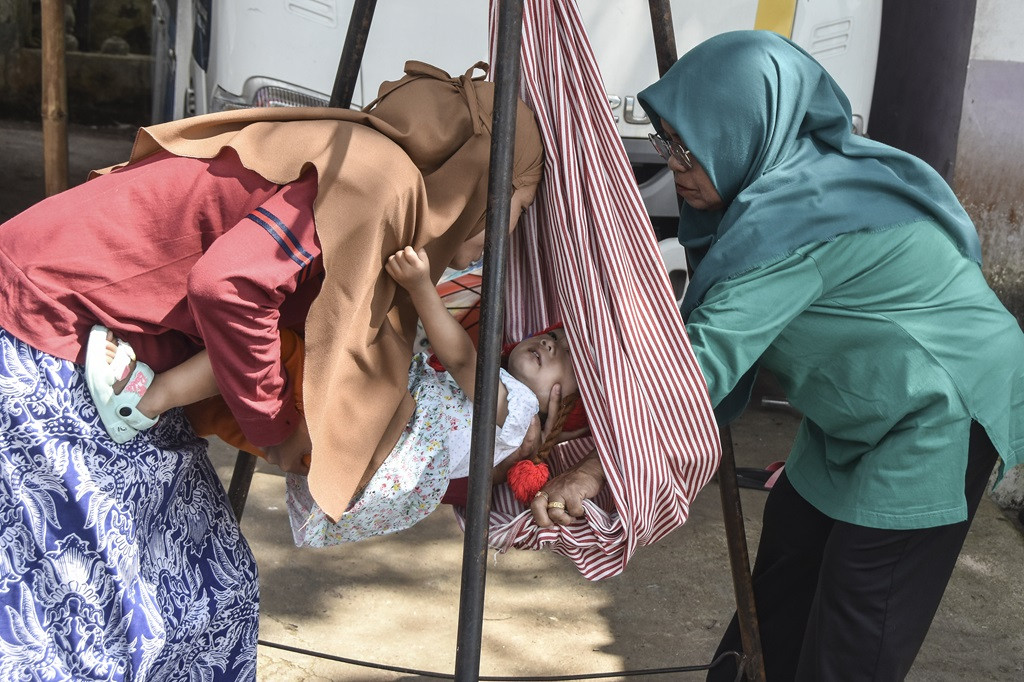Popular Reads
Top Results
Can't find what you're looking for?
View all search resultsPopular Reads
Top Results
Can't find what you're looking for?
View all search resultsStunting policy gets stunted
More than half of the targeted 82 million children probably do not need free meals at school and would not appreciate it as much since they get better and more nutritious food at home.
Change text size
Gift Premium Articles
to Anyone
A
lthough Indonesia is making progress in the campaign to cut the prevalence of stunting among children, at the rate of almost one in five children, that is still too high for the country to brag about success. We have a long way to go. And there is the question of whether the Free Nutritional Meal (MBG) program, a signature policy of President Prabowo Subianto, introduced in all schools nationwide, is the most effective form of intervention.
The latest National Nutritional Status Survey announced by the Health Ministry puts the stunting rate at 19.8 percent in 2024, down from 21.5 percent the previous year. That still leaves Indonesia in the top 15 countries in the world with the highest prevalence rates.
Indonesia is late in the game in curbing stunting. Previously, this had been addressed at local levels. A national campaign started during the previous administration of Joko “Jokowi” Widodo in 2021. The current campaign aims to accelerate the reduction of stunting and bring the rate to 14.2 percent by 2029.
Now the program seems on course, but even if the target is reached, we are still talking about several million children being born or raised with malnutrition or malnourishment, affecting their physical and intellectual growth beyond 2029. Indonesia’s current woeful performance in international sports and academic excellence ranking may be attributed in part to the problem of poor nutrition and stunting.
The government can do much better, cutting further the stunting rate, down to zero definitely by 2045, when Indonesia marks its 100th anniversary of independence.
The Golden Indonesia Vision 2045, a time when we envision ourselves as among the five largest economies in the world, a nation as developed as any today, would look awkward if millions of the country's children grew up malnourished. Vision 2045 seems questionable when a large portion of the population grows up with stunting, a condition which may undermine all efforts at reaching lofty goals.
The 2029 target year coincides with President Prabowo's end of term. It is no wonder that he has made it his top policy priority.
No other president before him has paid as much attention to the stunting problem, even as the country has made significant economic progress to reach the rank of a middle-income country, according to World Bank classification. Addressing the stunting problem ensures that no child is left behind by development.
Prabowo’s free lunch program, rolled out in schools throughout the country in January, is already running into serious problems of funding, administration and supervision, even though so far it only covers around 3 million of the 82 million targeted children. It is clearly a problem of scale. The government does not have the money or the administrative capability to run such a gigantic program.
By insisting on coverage of all children in both public and private schools, we are talking about the government feeding 82 million children every day. Already, the government is cutting back spending on other items, including education, health, infrastructure building and defense, to raise the money for the free lunch program.
The program is something that Prabowo promised in his campaign to win the presidential election last year. While his intention is noble, he is going about it the wrong way, and it could undermine the entire economy.
It would make much more sense, both financially and administratively, for the government to feed children from poor families. More than half of those 82 million children probably do not need the meal and would not appreciate it as much since they get better and more nutritious food at home.
To be effective, the campaign to reduce the stunting rate should be better targeted and focused. The government has already identified that stunting is most prevalent across Java, and in North Sumatra and East Nusa Tenggara provinces. Experts say the campaign should target expectant women and the under-fives as the most vulnerable groups.
By tinkering with the policy, including the free meal program, we could make faster progress in eradicating stunting in children.











